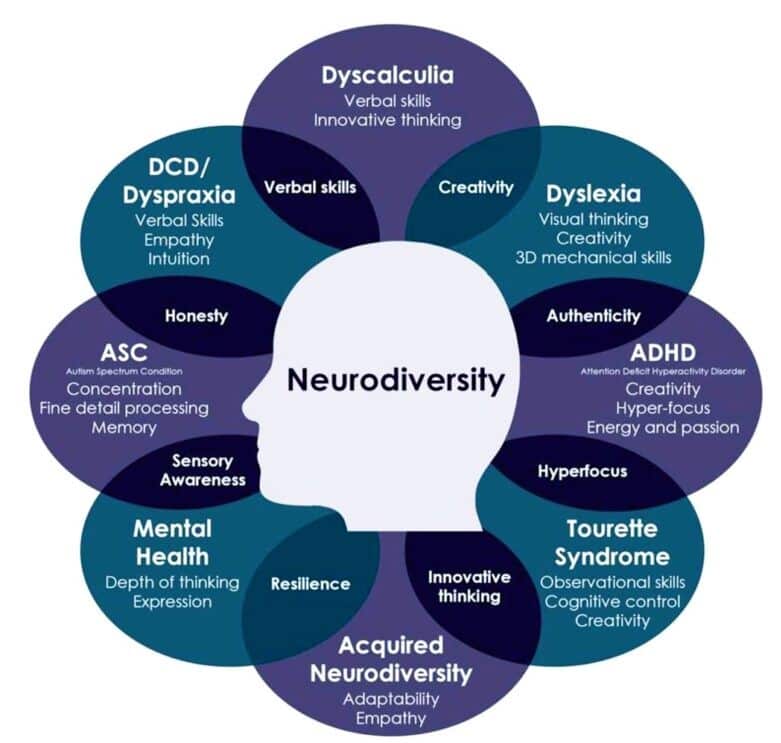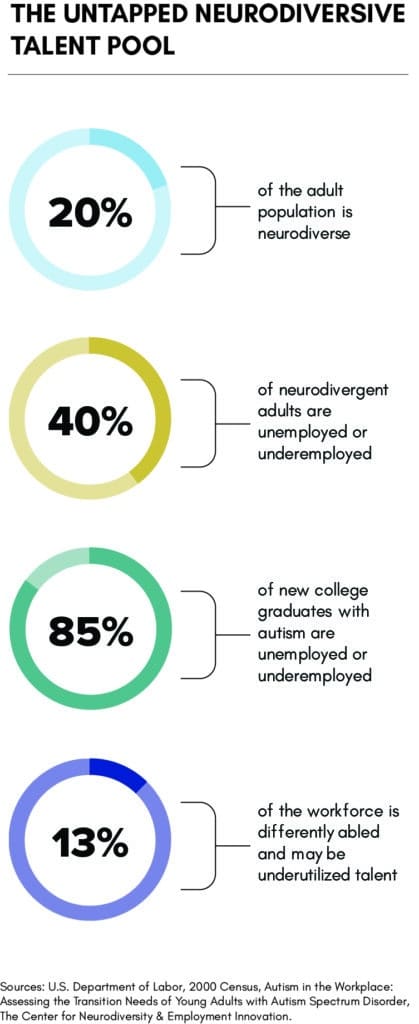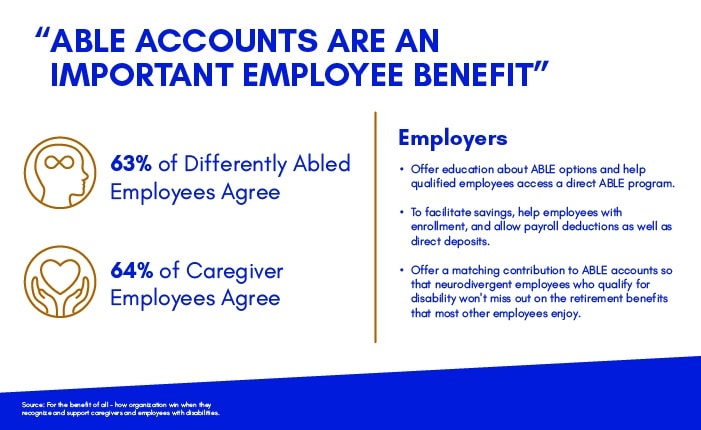
Embracing neurodiversity is about more than equality and inclusion; it’s also one of the best business moves companies can make.
By Kelly Crotty, Marketing Content Manager and Staff Writer
I’m considered neurodiverse because I have dyscalculia, a rare learning disability that makes mathematical reasoning and computation difficult.
I’m also a content marketer, which involves a fair amount of math.
For most, a role like this for someone like me seems paradoxical. After all, who wants a marketer with math problems?
My employer, Best Upon Request, does, and in return, I have taken their content “to the next level,” according to leadership.
I attribute much of my success to neurodiversity.
My brain, diverging from the statistical norm, “sees” things differently; therefore, I think differently, and as a result, my ideas are … well, different.
In the business world, where ideas are currency, having a team member who thinks differently, like me, is a real competitive advantage, a fact that more companies are catching onto.
Motivated by the tight labor market and the pressure to produce and innovate, organizations across industries, ranging from Microsoft to JPMorgan Chase, have launched initiatives to recruit neurodiverse talent. The outcomes of which are nothing short of exceptional.
As a result, neurodiversity is quickly becoming essential to companies’ talent strategies and DEI efforts.
Keep reading to discover the benefits of neurodiversity for businesses and the employee perks companies are investing in to attract and retain neurodiverse talent.
What is Neurodiversity?

The Overlapping Strengths of Neurodiversity, DR. NANCY DOYLE
Neurodiversity is the term used to describe the range of cognitive functioning within a population. You can think of this range as a spectrum.
On one end of the spectrum, there are neurotypical individuals, those who think and behave in ways that are considered within the human average.
On the other end of the spectrum, there are neurodivergent individuals, those who have less typical cognitive function.
This includes people with autism, ADHD, dyslexia or dyscalculia, just to name a few.
Many people with these disorders have special capabilities.
For instance, autistic individuals tend to have exceptional memories for facts and figures, advanced abilities in pattern recognition and enhanced analytical capabilities.
People with ADHD tend to be highly innovative thinkers with the ability to sustain intense focus for long durations of time.
Many of those with dyslexia have advanced spatial mechanical reasoning capabilities that allows them to visualize in three dimensions. They also tend to be creative thinkers.
And people with dyscalculia are often highly innovative and have advanced verbal skills.
What many companies have come to find is that the special capabilities neurodiverse people possess can boost creativity, innovation, productivity and quality control.
How Neurodiversity Benefits Businesses
1. Enhances Innovation
Neurodivergent employees have a long history of driving innovation with “out of the box” thinking, creativity and problem-solving.
For instance, well-noted dyslexic Steve Jobs made Apple a world leader in the tech industry, and with the invention of the iPhone, he changed life as we knew it.
Sir Richard Branson, the British billionaire whose entrepreneurial endeavors have revolutionized everything from music and leisure to travel and telecommunications, is also dyslexic.
And Elon Musk, whose company developed one of the world’s best-selling electric cars, has Asperger’s syndrome.
Every day neurodiverse employees are driving innovation too.
- Ernst & Young, an early adopter of neuro-inclusivity, revealed that its autistic employees excel at innovation which has been crucial to business growth.
- SAP, one of the world’s leading producers of business management software, reported that its neurodiverse customer support analysts resolved a problem impacting thousands of its customers, a challenge that had managed to elude the company for years.
Silvio Bessa, SAP’s senior vice president of digital business, tells Harvard Business Review that hiring neurodiverse talent “helps offset our tendency, as a big company, to all look in the same direction.”
2. Increases Productivity
In a world of ever-expanding demands, neurodiversity is also helping companies make significant productivity gains.
- JPMorgan Chase found that their autistic employees achieve 48%—140% more than neurotypical employees.
- The Australian Department of Human Services’ Aurora Neurodiversity Program reported that their autistic software testers are 30% more productive than their neurotypical peers and they’re more accurate.
In fact, neurodiversity is paying off for the tech industry so well that some are calling it their “secret weapon.”
What’s even more remarkable about these productivity outcomes is that they don’t stop at individual performance.
Research also shows that neurodivergent talent increases neurotypical employees’ productivity by as much as 30%.
3. Relieving the Labor Crunch
Organizations suffering from talent shortages are also finding neurodiversity beneficial.
During one of the tightest labor markets in recent history, neurodivergent individuals represent a vast, untapped talent pool.
Altogether, 20% of adults are neurodivergent; that’s one in five people — a substantial portion of the talent pool.
The unemployment rate among the neurodiverse population steadily hovers at 40%, while 85% of new college graduates on the autism spectrum face the same fate.
Companies are capitalizing on this differential to meet their talent needs.
- Ernst & Young started its Neurodiversity Center of Excellence after leaders recognized that neurodiverse talent could support the company’s business growth.
- JPMorgan Chase’s wildly successful Autism at Work program helped the company fill talent gaps in its software engineering and quality assurance departments.
- Microsoft just expanded its in-house neurodiversity hiring program after experiencing success with autistic talent.
With 10.7 million job openings that need to be filled and The Great Resignation still underway, it makes sense for organizations to finally tap into a capable yet underutilized sector of the population to find fresh talent.
Neuro-Inclusive Employee Benefits
As neurodiversity grows in popularity, employers are seeking new ways to build neuro-inclusive workplaces. As a result, an increasing number of organizations are investing in neuro-inclusive employee benefits, including more than 25% of Fortune 100 companies.
These benefits not only support neurodivergent talent but also support employees with neurodiverse children.
Fifty-two percent of parents who regularly access benefits designed to help neurodiverse minors report that the support gave them more time to spend on work. And 73% said the help increased their focus, according to Benefits Pro.
Keep reading to discover the four employee benefits that are helping companies support their neurodiverse talent and their employees with neurodiverse children.
1. Employee Concierge & Errand Running Services
Although I work for an organization that provides concierge services as an employee benefit, I didn’t realize how beneficial the program is for neurodiverse talent until a colleague with ADHD pointed out that it’s been a lifesaver for her.
ADHD impacts my colleague’s ability to organize, decide and execute things on time. As a result, she struggles to juggle her workload and personal life.
“To be frank, I need more support with all the little things to keep my life running smoothly,” she says. “The concierge service gives me that support.”
With the help of a concierge benefit my colleague has a resource to outsource everything from red-hot emergencies to mundane, medium-priority tasks.
“Work-life balance is going to be more difficult for me to achieve than it is for most of my co-workers, but the concierge service levels the playing field,” she says.
2. Employee Assistance Programs
Employee assistance programs (EAPs) are popular for organizations building inclusive benefit packages. Still, companies may want to think twice before going this route, according to Nancy Doyle, an organizational psychologist specializing in neurodiversity.
The problem is that most EAPs do not address the challenges that arise from neurocognitive differences, Doyles reveals to Forbes.
Instead, most EAPs address mild-to-moderate mental health issues by providing services like behavioral therapy, stress-management classes and work-life management programs, making it an excellent “benefit for all.”
Doyle recommends that employers consider in-house programs created explicitly to address neurocognitive differences if they have the resources.
Alternatively, employers can invest in an EAP that provides specialized services, such as workplace needs assessments, employee in-work mentoring or training, and expert advice geared toward managing the challenges that arise from neurocognitive differences.
3. Caregiver Benefits
Caregiver benefits help parents with neurodivergent dependents address needs that fall between the cracks of what health plans offer and what employee assistance plans cover.
While caregiver benefits include a wide variety of services, those that offer access to board-certified behavioral analysts and online resources, like evidence-based lessons that help children improve their social and academic skills, are the most helpful for parents, according to Benefits Pro.
Parents that have utilized these programs report that they give them the tools they need to understand and better support their children.
4. ABLE Accounts
ABLE accounts are an inclusive addition to traditional, employer-sponsored retirement savings plans.
Implemented in 2014, ABLE accounts compensate for retirement benefits, like the 401(k) and 403(b), that most employees with disabilities must forgo to maintain vital government benefits, putting them at a significant financial disadvantage.
The ABLE National Resource Center makes it easy for employers to set up, share and contribute to ABLE accounts — they even offer a toolkit.
However, only neurodiverse employees receiving disability will qualify. It’s important to note that not all neurodivergent people are disabled, nor are all people with disabilities neurodivergent.
Neurodiversity, like every other form of diversity, makes companies smarter, stronger and savvier. The overwhelming evidence from major employers’ neuro-inclusivity initiatives indicates that neurodiverse companies are more innovative and productive and less likely to suffer from staffing shortages. From Steve Jobs and Richard Branson to Elon Musk, the business world has a long and cherished history of neurodiverse talent whose ability to think differently led to groundbreaking, game-changing success. Imagine what might be possible if employers had neurodiverse talent at every level of their organizations.





